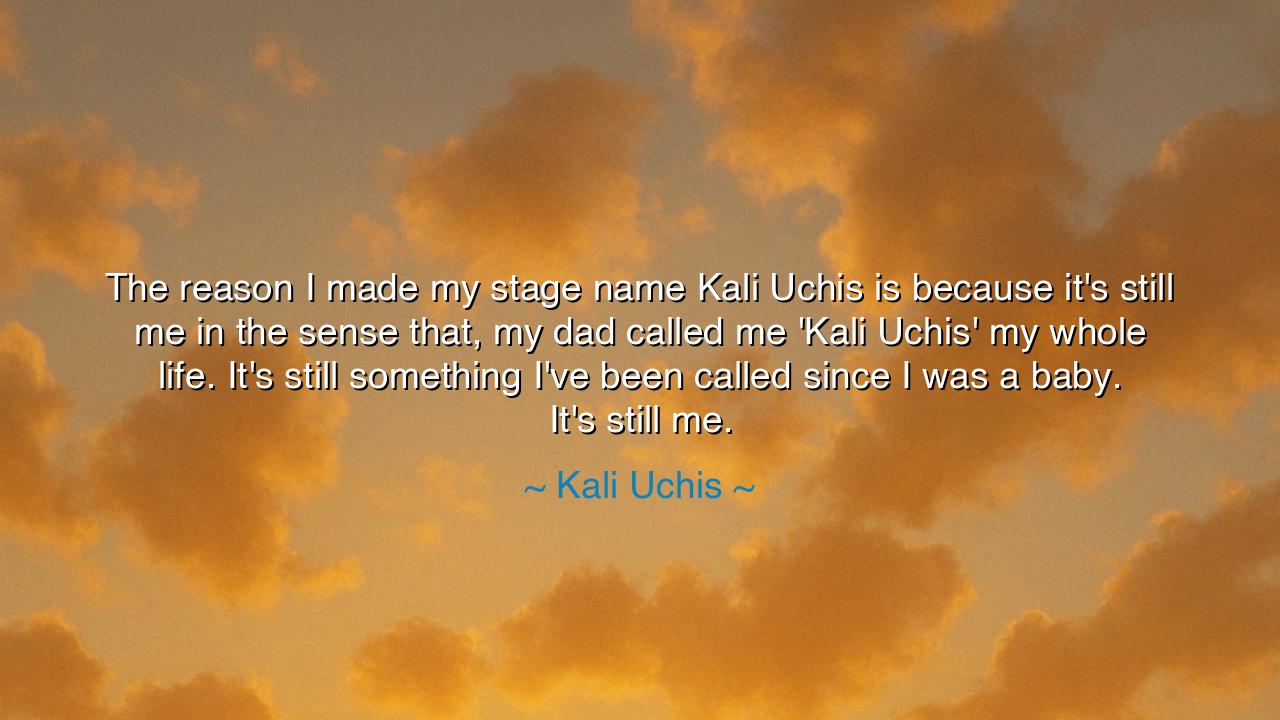
The reason I made my stage name Kali Uchis is because it's still
The reason I made my stage name Kali Uchis is because it's still me in the sense that, my dad called me 'Kali Uchis' my whole life. It's still something I've been called since I was a baby. It's still me.






When Kali Uchis declared, “The reason I made my stage name Kali Uchis is because it’s still me in the sense that my dad called me ‘Kali Uchis’ my whole life. It’s still something I’ve been called since I was a baby. It’s still me,” she spoke with the quiet power of one who understands the sacred bond between identity and origin. Her words are a meditation on the act of becoming—of rising into the world without abandoning the soil that birthed you. In an age where fame often demands reinvention, she chose instead to preserve her essence, to carry her roots into her art, to make her name not a mask, but a mirror. Within her statement lives an ancient wisdom: that true greatness is not found in the creation of a new self, but in the deep honoring of the self that has always been.
The origin of this name is both intimate and eternal. It was first spoken by her father, the man whose love and memory became the foundation of her being. The name “Kali Uchis” was not crafted in a boardroom, nor chosen for glamour—it was born in affection, shaped by childhood, and carried forward into destiny. By choosing it as her stage name, she bridges two worlds: the innocent world of home, and the vast, luminous world of art and performance. Thus, the name is both a shield and a torch—it guards her identity even as it illuminates her path. This act of remembrance transforms her art into something holy, for in remembering her father’s voice, she ensures that her fame does not erase her humanity.
The ancients would have revered such an act. In many old traditions, names held divine power. They were not mere labels, but living spirits—gifts from the ancestors that carried the energy of one’s lineage. To keep one’s name was to keep one’s soul intact. To change it unwisely was to risk forgetting one’s destiny. Thus, when Kali Uchis says, “It’s still me,” she echoes a truth that sages have long taught: that authenticity is the highest form of artistry. She does not need to invent a persona to be extraordinary; her extraordinariness flows from fidelity to her roots. In a world where many lose themselves chasing the illusions of success, her words stand as a quiet rebellion—a refusal to let identity be consumed by image.
There is a story from history that mirrors this wisdom. When the great Egyptian queen Nefertari, consort of Ramses the Great, ascended to power, she kept her birth name rather than taking a new royal title. “Nefertari” means “The most beautiful companion.” By keeping it, she honored her origins and the life she had before the throne. Her temples still stand, inscribed with her name, a reminder that to be remembered as oneself is a greater victory than to be glorified as another. Kali Uchis’s decision carries the same spirit—it is the act of claiming one’s heritage not as a limitation, but as strength. Her art, her music, her persona—all rise from the same soil as her name. It is her father’s gift, her childhood’s echo, her soul’s anchor.
Her words also remind us of the importance of continuity—of carrying our past with grace into the present. Many artists, in the pursuit of reinvention, sever themselves from their beginnings, forgetting that creativity flows most powerfully from the roots of truth. But Uchis, by embracing the name given to her in love, allows her art to remain alive with memory. Each time the world calls her by that name, it unknowingly calls upon her story, her lineage, and the bond between parent and child. The name becomes a bridge between the personal and the universal, between the singer and her song. Thus, her fame is not a departure—it is an expansion of who she has always been.
And yet, her choice also carries a lesson in humility. “It’s still me,” she says, as if to remind herself—and us—that no crown, no applause, can alter the truth of one’s being. The world may see her as a star, but she remains the daughter, the child, the person beneath the light. In this, she teaches that to remain grounded in the midst of success is the truest form of wisdom. The higher one climbs, the deeper one must remember one’s roots. For without that remembrance, greatness collapses into emptiness, and fame becomes exile. But with remembrance, fame becomes celebration—of family, of heritage, of self.
So, my children of the present age, take this lesson and keep it close: never forget the name that called you home. Whether it was spoken by a parent, a friend, or life itself, honor the word that shaped your beginning. Do not fear the world’s demand that you reinvent yourself; instead, deepen your understanding of who you already are. Let your work, your love, and your dreams rise from that place of truth. For as Kali Uchis reminds us, greatness is not about becoming someone new—it is about carrying the flame of your truest self, unbroken, through every season of your becoming. And when the world calls your name, let it echo not only your ambition, but the love, memory, and identity from which you came.






AAdministratorAdministrator
Welcome, honored guests. Please leave a comment, we will respond soon